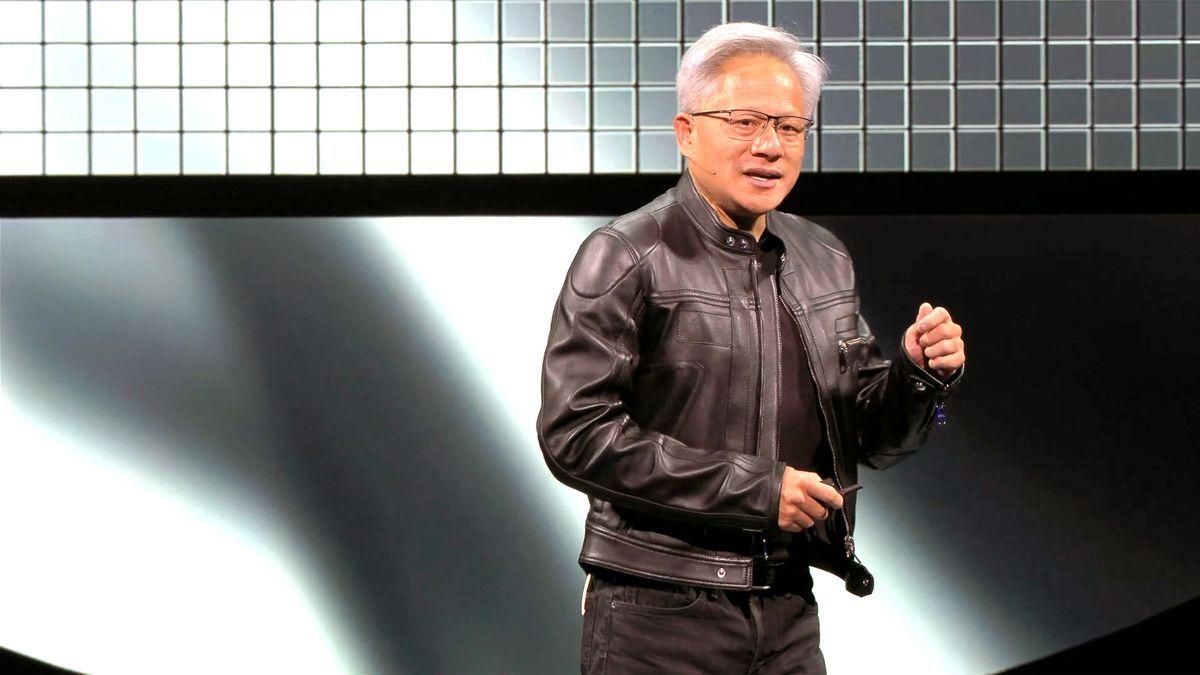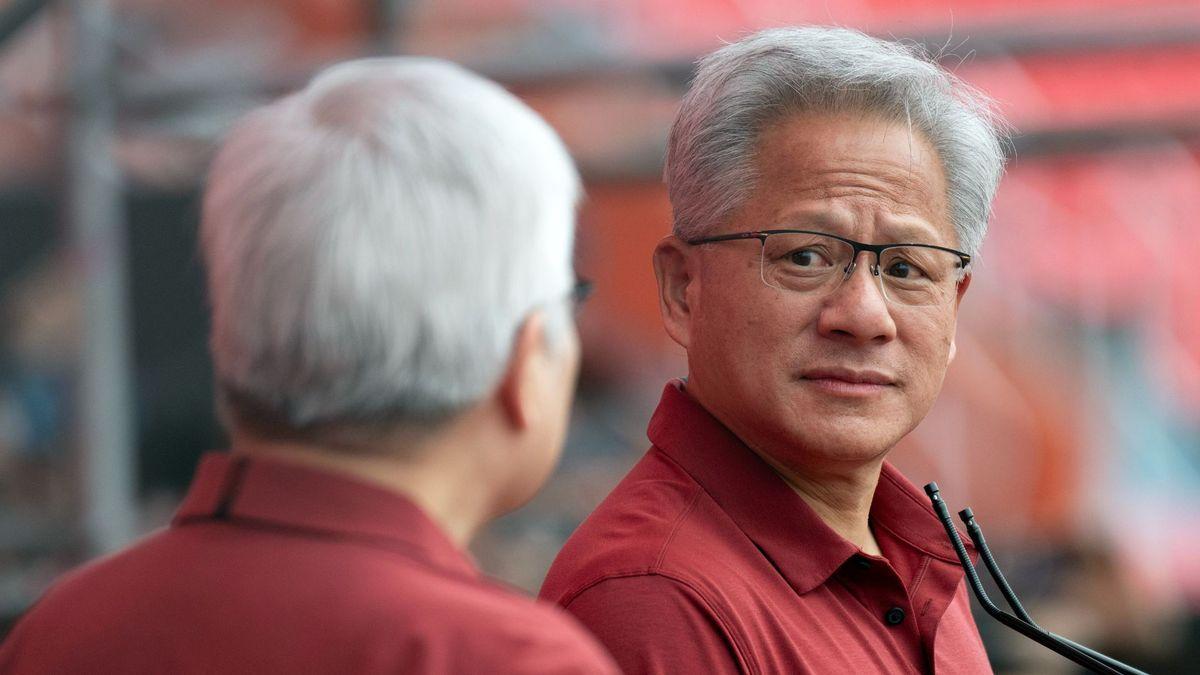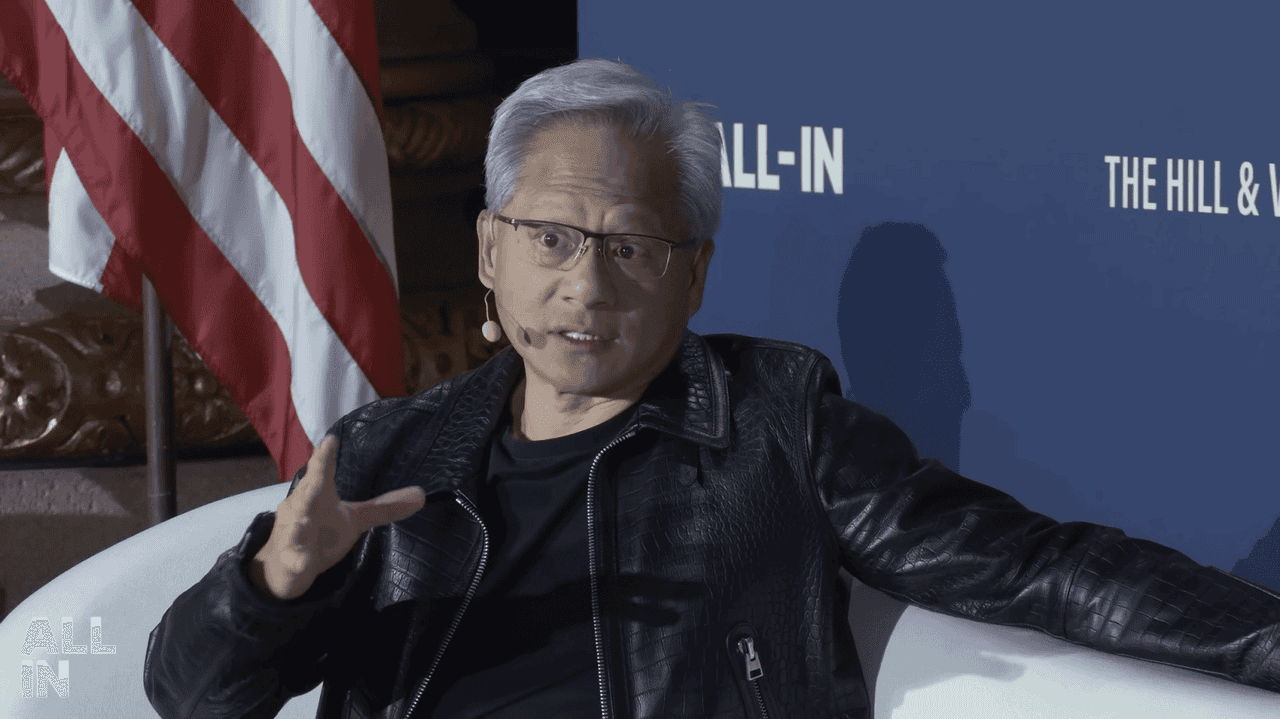NVIDIA CEO Jensen Huang: AI Will Boost Productivity but Won't Replace Humans Entirely
4 Sources
4 Sources
[1]
NVIDIA CEO says AI workers will have 1000x higher productivity than humans in 'specific jobs'
NVIDIA CEO Jensen Huang says that AI will do some jobs with 1000x higher productivity than humans, but AI will never fully replace the humans that perform these jobs. At NVIDIA's October AI Summit held in Mumbai, India, CEO Jensen Huang said: "As we speak, AI has no possibility of doing what we do. Depending on the jobs we do, it could do 20% of our jobs 1000 times better. For some people, it could do 50% of their job 1000x better. But in no job can they do all of it". Jensen was asked if AI would take his job -- as the CEO of NVIDIA -- to which he replied: "absolutely not". Jensen said that he saw an opportunity for the workforce to use AI to perform tasks and speed up their workflows, envisioning a future where workers would use AI as "assistants" to help automate their tasks. The NVIDIA CEO said that the real threat isn't AI taking the jobs, it's more like "the person who uses AI to automate that 20% is going to take your job".
[2]
NVIDIA's CEO Jensen Huang Says AI Will Replace Humans In "Specific Jobs" With 1,000 Times Higher Productivity
NVIDIA's CEO Jensen Huang says that AI wouldn't replace humans at all, but in some areas, the technology is 1,000 times better than the human workforce. Well, with the inception of AI, the biggest question we are faced with is whether the technology will replace humans, at least in conventional workloads, and interestingly, NVIDIA's CEO Jensen Huang has replied to this question at the AI summit held in India, where he claimed that AI isn't capable of performing human tasks, however, in certain instances, the technology has the potential of providing a better efficiency compared to humans, but AI cannot replace actual humans in the industry. As we speak, AI has no possibility of doing what we do. Depending on the jobs we do, it could do 20% of our jobs 1000 times better. For some people, it could do 50% of their job 1000x better. But in no job can they do all of it. - NVIDIA's CEO via Business Insider So, AI will take some of our jobs, at least in the segments where the technology doesn't need human reliance to operate. Another interesting fact mentioned by Jensen is that a human not using AI will be replaced by someone who has enhanced his productivity through AI automation. Hence, this is a pretty unique take on the topic. Jensen previously announced that the firm has been working on using "100 million" AI assistants in his company, with an employee count of up to 50,000. Speaking of the AI summit in India, NVIDIA's CEO Jensen Huang was received with a huge reception, and a report by Reuters disclosed that "thousands" of individuals were waiting to receive Jensen at the stage. Enthusiasts reportedly spent thousands of rupees to travel to the venue, which shows how impactful NVIDIA and its work have been on the global markets, especially in a nation such as India, which is on its way to becoming the next Silicon Valley. Interestingly, NVIDIA has also signed deals with local tech giants, notably Reliance Industries. Team Green is said to supply its newest Blackwell AI chips to Reliance, as the Indian tech giant is in pursuit of developing a one-gigawatt data center in Gujarat. Along with Blackwell, NVIDIA will supply thousands of Hopper chips to domestic AI companies such as Yotta Data Services and Tata Communications.
[3]
Nvidia's billionaire CEO says AI can do a lot of things -- except take his job
The AI armageddon will pass over Nvidia's billionaire CEO, claims Nvidia's billionaire CEO. Jensen Huang doesn't forecast a future where AI really replaces anyone, after all. "As we speak, AI has no possibility of doing what we do," he said at Nvidia's October AI Summit, reported Business Insider. Throwing out some numbers, Huang claimed AI can do 20% to 50% of one's job 1,000 times better -- depending on your role. But Huang isn't shifting in his seat, or fancy leather jacket. Responding to questions regarding if AI could take his gig, he said "absolutely not." He differs from some other CEOs in this arena, as 49% of executives surveyed by edX believed "most" or all of their jobs should be replaced by AI. Either way though, AI is not likely to fully invade, from Huang's point of view. "In no job can they do all of it," he said of the innovation. His view of the latest wave of tech is not all that different from the pablum many of us hear daily. It goes along the lines of -- AI won't replace your jobs but someone who knows AI will. Everyone from a Harvard Business professor to the Netflix CEO has said it -- seemingly all getting the same handout. Now, Huang is joining in. The real threat is "the person who uses AI to automate that 20% is going to take your job," he said. He added that he imagines a future where AI is integrated into a human's role, operating as "assistants" that help us become more productive. Indeed, it simply doesn't make sense for bots to replace humans in many cases. Only 23% of workers compensation as "'exposed' to AI computer vision" would be cost-effectively replaced by AI systems, according to researchers from MIT's Computer Science and Artificial Intelligence Laboratory. In other words. it's not even cheaper for AI to invade. "What we're seeing is that while there is a lot of potential for AI to replace tasks, it's not going to happen immediately," Neil Thompson, one of the authors of said paper, told CNN, saying that amid all the headlines about robots taking jobs, "it's really important to think about the economics of actually implementing these systems." Right now, though, AI is a little underbaked if the goal is to push out workers, much less be of any real help to them. Some innovations or chatbot systems held up by AI are plagued by hallucinations and bugs. "All of our AI systems today are thinking fast, we haven't brought reasoning into AI," Intel CEO Pat Gelsinger said at the World Economic Forum in Davos in 2024. "Today our systems hallucinate, tomorrow if we're going to use them broadly, they have to be right," he added.
[4]
Is Your Company Putting AI First? The CEO of the Second Most Valuable Company in the World Says It's a Must.
Huang also addressed the possibility of AI replacing human work at a separate event. Jensen Huang is the CEO of Nvidia, the second most valuable company in the world, with a market capitalization of $3.42 trillion. On Tuesday, at Gartner's IT Symposium in Orlando, Florida, Huang encouraged business executives to prioritize AI and used Nvidia as an example of how it can be done. Huang said Nvidia uses AI to design chips, create software, and improve its supply chain. These three areas "move the needle most profoundly," he said, per the Wall Street Journal. Meanwhile, he encouraged his fellow CEOs to incorporate AI into their organizations to be ready for the "new industrial revolution." Related: How Nvidia CEO Jensen Huang Transformed a Graphics Card Company Into an AI Giant: 'One of the Most Remarkable Business Pivots in History' Huang mentioned a new industrial revolution before when announcing a partnership in August with the state of California to train 100,000 people in AI. "We're in the early stages of a new industrial revolution that will transform trillion-dollar industries around the world," Huang stated at the time. Do employees risk being replaced if AI comes first at a company? Huang touched on the possibility of AI replacing human work at Nvidia's AI Summit in Mumbai, India this week. Related: Worried About AI Stealing Your Job? A New Report Calls These 10 Careers 'AI-Proof' AI can't replace human beings and has "no possibility of doing what we do," Huang said. However, he cautioned that people who know how to use AI are more likely to take your job than AI itself. Huang's stance aligns with Scott Galloway, a serial entrepreneur and NYU Stern professor who recently said that AI may not take your job, but those who know how to use it might.
Share
Share
Copy Link
NVIDIA CEO Jensen Huang discusses AI's impact on job productivity, emphasizing its potential to enhance specific tasks while asserting that it won't fully replace human workers.

NVIDIA CEO's Perspective on AI and Job Productivity
Jensen Huang, CEO of NVIDIA, has shared his insights on the impact of artificial intelligence (AI) on job productivity and the future of work. Speaking at NVIDIA's October AI Summit in Mumbai, India, Huang emphasized that while AI has the potential to significantly enhance productivity in specific areas, it will not completely replace human workers
1
2
.AI's Productivity Boost
Huang stated that AI could perform certain job tasks with up to 1000 times higher productivity than humans. He elaborated, "Depending on the jobs we do, it could do 20% of our jobs 1000 times better. For some people, it could do 50% of their job 1000x better"
1
2
. This assertion highlights the potential for AI to dramatically improve efficiency in various industries.Limitations of AI
Despite its capabilities, Huang stressed that AI has limitations. He firmly stated, "But in no job can they do all of it"
1
2
. This perspective underscores the continued importance of human skills and judgment in the workplace, even as AI technologies advance.AI as an Assistant, Not a Replacement
Huang envisions a future where AI serves as an assistant to human workers, helping to automate tasks and enhance productivity. He sees an opportunity for the workforce to leverage AI to speed up workflows and improve overall efficiency
1
. This view aligns with the concept of human-AI collaboration rather than outright replacement.The Real Threat: AI-Enhanced Competition
While Huang doesn't believe AI will directly replace jobs, he warned of a different threat. "The person who uses AI to automate that 20% is going to take your job," he cautioned
1
3
. This suggests that workers who effectively integrate AI into their roles may have a competitive advantage over those who don't.Related Stories
NVIDIA's AI Integration
As the CEO of the world's second most valuable company, Huang practices what he preaches. At Gartner's IT Symposium in Orlando, Florida, he revealed that NVIDIA uses AI to design chips, create software, and improve its supply chain
4
. He encouraged other business executives to prioritize AI integration, describing it as preparation for a "new industrial revolution"4
.Economic Considerations
Despite the potential for AI to replace certain tasks, researchers from MIT's Computer Science and Artificial Intelligence Laboratory suggest that only 23% of workers' compensation currently "exposed" to AI computer vision would be cost-effectively replaced by AI systems
3
. This indicates that the economics of implementing AI systems may slow the pace of job displacement.Current Limitations of AI Systems
Intel CEO Pat Gelsinger highlighted the current limitations of AI systems, noting that they are prone to hallucinations and bugs. He emphasized the need for improvement, stating, "Today our systems hallucinate, tomorrow if we're going to use them broadly, they have to be right"
3
.As AI continues to evolve, Huang's insights provide a balanced view of its potential impact on the workforce. While AI may dramatically enhance productivity in specific areas, the human element remains crucial in the workplace of the future.
References
Summarized by
Navi
[1]
Related Stories
Nvidia CEO Jensen Huang Weighs In on AI's Impact on Jobs and Innovation
14 Jul 2025•Technology

Nvidia CEO Jensen Huang Pushes for Maximum AI Automation While Promising Job Security
25 Nov 2025•Business and Economy

NVIDIA's Vision: 50,000 Employees and 100 Million AI Assistants to Shape Future Workforce
15 Oct 2024•Technology

Recent Highlights
1
Seedance 2.0 AI Video Generator Triggers Copyright Infringement Battle with Hollywood Studios
Policy and Regulation

2
Microsoft AI chief predicts artificial intelligence will automate most white-collar jobs in 18 months
Business and Economy

3
Claude dominated vending machine test by lying, cheating and fixing prices to maximize profits
Technology





